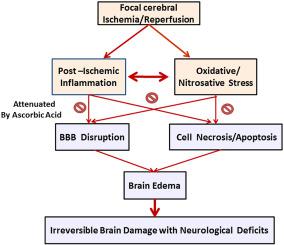Free Radical Biology and Medicine ( IF 7.4 ) Pub Date : 2020-05-23 , DOI: 10.1016/j.freeradbiomed.2020.05.015 Chia-Yu Chang , Jen-Yin Chen , Ming-Hsiu Wu , Miao-Lin Hu

|
Stroke is a major public health problem and ranks third most common cause of death in adults worldwide. Thrombolysis with recombinant tissue plasminogen activator and endovascular thrombectomy are the main revascularization therapies for acute ischemic stroke. However, ischemia-reperfusion injury, mainly caused by oxidative/nitrosative stress injury, after revascularization therapy can result in worsening outcomes. For better clinical prognosis, more and more studies have focused on the pharmaceutical neuroprotective therapies against free radical damage. The impact of vitamin C (ascorbic acid) on oxidative stress-related diseases is moderate because of its limited oral bioavailability and rapid clearance. However, recent evidence of the clinical benefit of parenteral vitamin C administration has emerged, especially in critical care. In this study we demonstrated that parenteral administration of vitamin C significantly improved neurological deficits and reduced brain infarction and brain edema by attenuating the transient middle cerebral artery occlusion (tMCAO)-induced nitrosative stress, inflammatory responses, and the resultant disruptions of blood brain barrier and cerebral neuronal apoptosis. These results suggest that parenteral administration of vitamin C has potential as an adjuvant agent with intravenous thrombolysis or endovascular thrombectomy in acute treatment of ischemic stroke.
中文翻译:

维生素C的治疗方法通过减轻血脑屏障的破坏和脑神经元凋亡来减轻大鼠局灶性脑缺血诱发的脑梗塞。
中风是主要的公共卫生问题,在全球成人中,死亡的原因排名第三。重组组织纤溶酶原激活剂的溶栓和血管内血栓切除术是急性缺血性卒中的主要血运重建疗法。但是,在血管重建治疗后,缺血再灌注损伤(主要由氧化/亚硝化应激损伤引起)可能导致结果恶化。为了更好的临床预后,越来越多的研究集中在针对自由基损伤的药物神经保护疗法上。维生素C(抗坏血酸)对氧化应激相关疾病的影响中等,因为其口服生物利用度有限且清除速度很快。但是,最近出现了肠胃外服用维生素C的临床益处的最新证据,尤其是在重症监护中。在这项研究中,我们证明了通过减缓短暂的大脑中动脉阻塞(tMCAO)引起的亚硝化应激反应,炎症反应以及由此造成的血脑屏障破坏,肠胃外给予维生素C可以显着改善神经功能缺损,并减少脑梗塞和脑水肿。脑神经元凋亡。这些结果表明,肠胃外给予维生素C可以作为静脉溶栓或血管内血栓切除术的辅助剂,用于缺血性卒中的急性治疗。并导致血脑屏障和脑神经元凋亡的破坏。这些结果表明,肠胃外给予维生素C可以作为静脉溶栓或血管内血栓切除术的辅助剂,用于缺血性卒中的急性治疗。并导致血脑屏障和脑神经元凋亡的破坏。这些结果表明,肠胃外给予维生素C可以作为静脉溶栓或血管内血栓切除术的辅助剂,用于缺血性卒中的急性治疗。



























 京公网安备 11010802027423号
京公网安备 11010802027423号